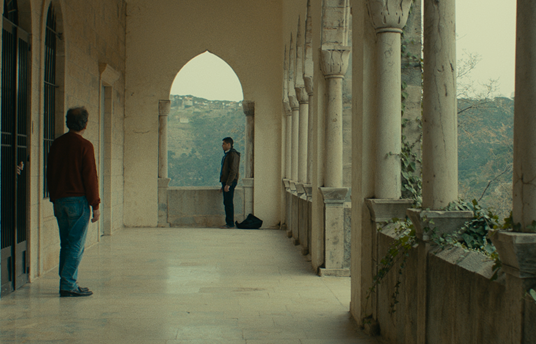ربيع
New Voices in Cinema

/ فيلم روائي طويل / لبنان ،فرنسا ،الإمارات العربية المتحدة ،قطر / ٢٠۱٦ / ملوّن
بالعربية / الترجمة بالإنجليزية
غير معروف
التصنبف: Parental guidance advised for viewers under the age of 15. Individuals under the age of 15 are not admitted into cinemas unless accompanied by an individual aged 18 or over.
- إرجع لاحقا لمشاهدة جدول عرض الأفلام
الملخص
ربيح شاب محبوب من العائلة والأصدقاء والمجتمع داخل إحدى البلدات اللبنانية التي يعتبرها بيته. يمضي ربيح، وهو مغنٍّ وطبال ضرير يتمتع بموهبة فذة، الكثير من وقته في التدرّب بصحبة الفرقة الموسيقية التي يعزف معها. وذات يوم، تتلقّى الفرقة دعوة للعزف في أوروبا، فَيتوجّه ربيح، الذي يتقد حماسًا وشغفًا، إلى مكتب الأمن العام في لبنان للحصول على جواز سفره، ليكتشف عندئذ عدم تطابق بيانات معينة مع بطاقة هويته. وبعد أن يتم منعه من السفر إلى أن يتمكّن من إثبات هويته أمام السلطات الرسمية، لا يجد ربيح بدًا من النبش في ماضي عائلته واستنطاق أسراره.
ومن هنا يبدو واضحًا أن المخرج فاتشي بولغورجيان يسعى في فيلمه "ربيح" إلى تسليط الضوء على قصة تحاكي التجربة المؤلمة التي عاشها لبنان في تاريخه الحديث، إذ يطرح ربيح أسئلة عن الماضي توقظ فينا مشاعر الخوف والاحتقار والندم والسخط، ويتلقّى ردودًا لا تبدو أكاذيب صريحة ولكنها مثقلة بمحاولات واهية لتبرير حالة لا تنسى من الخزي والذل. وفي الوقت نفسه، يأخذ الفيلم بعدًا عالميًا عند استكشاف مشاعر الحزن والشعور بالذنب والخجل التي تنجم عن الكذب والخيانة.
يحرص المخرج على تجنّب الإفراط في إسباغ الطابع الدرامي على الفيلم أو إلقاء اللوم، بل يسعى بدلاً من ذلك إلى الحفاظ على الفهم المتوازن الناتج عن مشاهدة شخصيات تسجّل بعيونها ووجوهها ومضات تشي باستحقاق اللوم، وهي المقاربة التي تلهم على نحو ملائم التوافق بدلاً من العداء، وتشجّع على الحرية المستمّدة من الحقيقة لا على السجن الذي يمثّله الخداع.